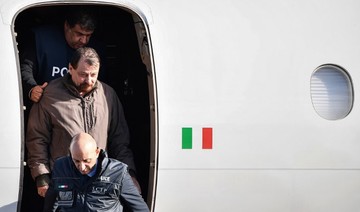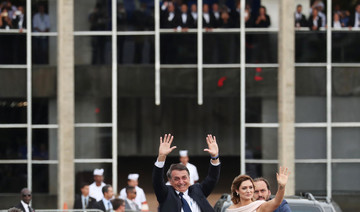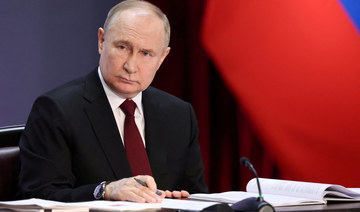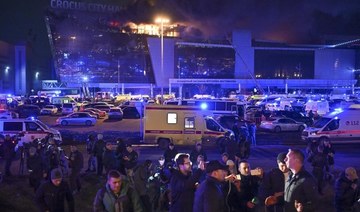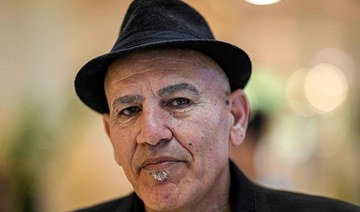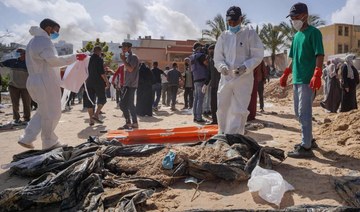PARIS: The jailing this week of former communist radical Cesare Battisti, a key figure in the violent turmoil in Italy of the 1970s, has brought back memories of a time when leftist killings raged across Europe and beyond.
Battisti, 64, finally returned to jail in Italy on Monday after nearly four decades on the run following his escape from prison in 1981.
Ultra-leftist groups like his own sowed chaos during the period in Italy known as the “Years of Lead” — named after the number of bullets fired — from the late 1960s to mid-1980s.
Across Europe, it was a time when radical youths sought to smash the capitalist system with a wave of bombings, assassinations, hostage-takings and plane hijackings.
West Germany’s Red Army Faction, whose most extreme members were known as the Baader-Meinhof gang, carried out a string of attacks on “capitalist” targets such as police and US troops.
France’s Action Directe group also waged attacks in the name of the proletariat, while in junta-ruled Greece militants targeted the CIA, banks and industrialists among others.
In Lebanon, radicals in the diaspora set up the Armenian Secret Army for the Liberation of Armenia (ASALA) to fight Turkish interests, mostly in Europe.
And the Japanese Red Army, which waged terror at home and around the world, sought the overthrow of the country’s monarchy along with a global revolution.
Against the backdrop of the Vietnam war, the US-backed 1973 coup in Chile, student demos and trade union battles, a tide of anti-imperialist sentiment helped spur the radicals into violent action.
These groups built links and passed weapons across borders at a time when Palestinian guerillas like the Marxist Popular Front for the Liberation of Palestine were also flourishing.
Venezuelan Carlos the Jackal, for instance — the most-wanted terrorist of the era — was accompanied by the German radical Hans-Joachim Klein for his spectacular hostage-taking at the OPEC headquarters in Vienna in 1975.
“At the end of the 1960s, young rebels were turning to armed action with the idea of fighting the last fascists,” said Mosco Levi-Boucault, a French film director who produced a series about Italy’s notorious Red Brigades.
Just 15 years or so after the end of World War II, ex-fascists were prime targets for leftist revolutionaries.
“At the time, Italian factories still employed former fascists as foremen,” Levi-Boucault said.
“One of them was found with his head shaved, tied to the gates of the Fiat factory in Turin.”
The man survived, but he was one of the lucky ones.
In the most infamous of their attacks, the Red Brigades kidnapped and murdered Italy’s former conservative prime minister Aldo Moro in 1978.
Historian Marc Lazar, an expert on the period from the Institute of Political Science in Paris, said the fact that democracy was still relatively new in some countries made the resort to violence seem more acceptable.
In Italy, he added, leftwing militants were also out to fight the far-right which was itself waging attacks — such as the 1969 Milan bombing that left 16 dead — in a bid to justify a return to an authoritarian regime.
The particular violence in Italy, which Lazar estimates left more than 400 people dead, came from “one-upmanship in the escalation of violence between far-right and far-left.”
Battisti, who belonged to the Armed Proletarians for Communism group, was sentenced to life imprisonment in 1971 for shooting dead two Italian policemen.
After his jailbreak he lived for years in Brazil under the protection of former leftist president Luiz Inacio Lula da Silva.
But the country’s new far-right President Jair Bolsonaro had vowed on the campaign trail to send Battisti back to Italy.
Battisti went on the run again — but was tracked down in Bolivia last week and swiftly extradited after authorities there ignored his asylum request.
Militant’s jailing a throwback to 1970s leftist terror wave
Militant’s jailing a throwback to 1970s leftist terror wave
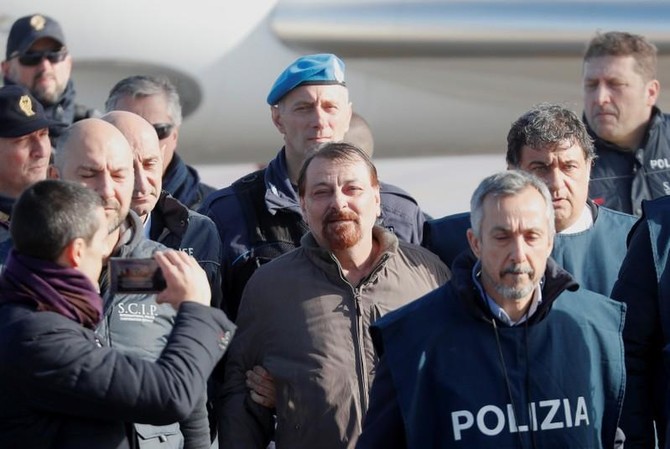
- Brazil’s new far-right President Jair Bolsonaro had vowed on the campaign trail to send Battisti back to Italy
- Battisti was tracked down in Bolivia last week and swiftly extradited after authorities there ignored his asylum request
Ukraine suspends consular services abroad for men of fighting age

- Ukraine’s foreign affairs ministry “announced a temporary suspension of accepting new applications for consular services” for men between 18 and 60
- It made an exception for documents allowing Ukrainians to return to Ukraine
KYIV: Ukraine authorities on Tuesday suspended consular services for men of fighting age living abroad, after announcing measures to bring them home amid manpower shortages in the army fighting Russia.
Ukraine’s army has been struggling to hold frontlines, partly due to a lack of soldiers over two years into Russia’s invasion.
Ukraine’s foreign affairs ministry “announced a temporary suspension of accepting new applications for consular services” for men between 18 and 60.
It made an exception for documents allowing Ukrainians to return to Ukraine.
The move would likely oblige Ukrainian men to return from abroad to undergo administrative procedures that were previously available abroad.
The government has already adopted a mobilization law, due to come into force on May 18, that toughens penalties against draft dodgers and obliges men to keep their military registration up-to-date.
The ministry said men would be able to access consular services once the law came into force and “after updating their military registration.”
“Male citizen of Ukraine aged 18 to 60 with valid military registration documents will have full access to consular services,” the ministry said.
Ukrainian men have been forbidden to leave the country since the invasion began, apart from a few exceptions.
But some lived away before the war began, and Ukrainian media estimates that thousands more illegally fled the country.
Major arrests at NYU campus as Gaza protests spread
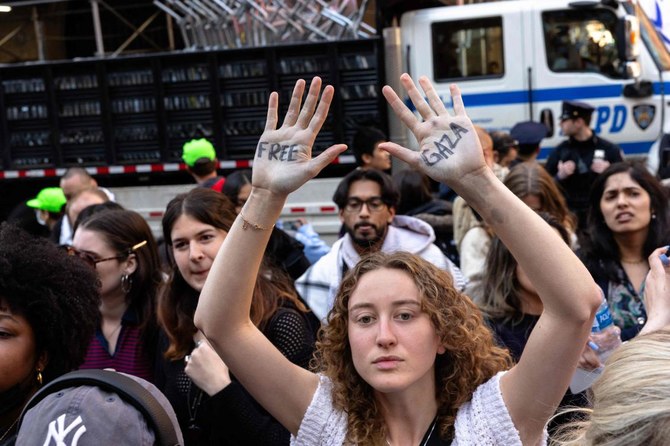
- Some of America’s most prestigious universities have been rocked by protests in recent weeks
- On Tuesday, the New York Police Department said 133 people had been arrested at NYU and released after being issued with court summons
NEW YORK: More than 130 people were arrested overnight during pro-Palestinian protests at the New York University campus, as student demonstrations gather pace in the United States over the Israel-Hamas war.
Some of America’s most prestigious universities have been rocked by protests in recent weeks as students and other agitators take over quads and disrupt campus activities.
The demonstrations come amid sweeping debates over Israel’s assault on Gaza, following Hamas’s deadly invasion on October 7.
Such bastions of higher education — Harvard, Yale, Columbia and others — are grappling for a balance between students demanding free speech rights and others who argue that campuses are encouraging intimidation and hate speech.
On Tuesday, the New York Police Department told AFP that 133 people had been arrested at NYU and released after being issued with court summons, as protests also intensify at Yale, Columbia University and other campuses.
As the holiday of Passover began Monday night, police began detaining demonstrators at an encampment at NYU who had earlier refused orders to disperse.
A New York University spokesman said the decision to call police came after additional protesters, many of whom were not thought to be affiliated with NYU, suddenly breached the barriers erected around the encampment.
This “dramatically changed” the situation, the spokesman said in a statement on the school’s website Monday, citing “disorderly, disruptive and antagonizing behavior” along with “intimidated chants and several antisemitic incidents.”
“Given the foregoing and the safety issues raised by the breach, we asked for assistance from the NYPD. The police urged those on the plaza to leave peacefully, but ultimately made a number of arrests.”
The spokesman said the school continues to support freedom of expression and the safety of students.
But protests have grown large and disruptive enough — New York Police Department spokesmen have spoken of their officers facing violence when confronting protesters at NYU — to draw the attention of President Joe Biden and his administration.
“Anti-Semitic hate on college campuses is unacceptable,” US Secretary of Education Miguel Cardona posted on X on Tuesday, expressing concern about the unrest.
The protests began last week at Columbia University, also in New York, with a large group of demonstrators establishing a so-called “Gaza Solidarity Encampment” on school grounds.
But more than 100 protesters were arrested after university authorities called the police onto Columbia’s campus Thursday, a move that seemingly escalated tensions and sparked a greater turnout over the weekend.
Social media images late Monday appeared to show pro-Palestinian Jewish students holding traditional seder meals inside the protest areas on campuses including at Columbia.
There were also demonstrations at MIT, the University of Michigan, UC Berkeley and Yale, where at least 47 people were arrested Monday after refusing requests to disperse.
France arrests eight in PKK financing probe
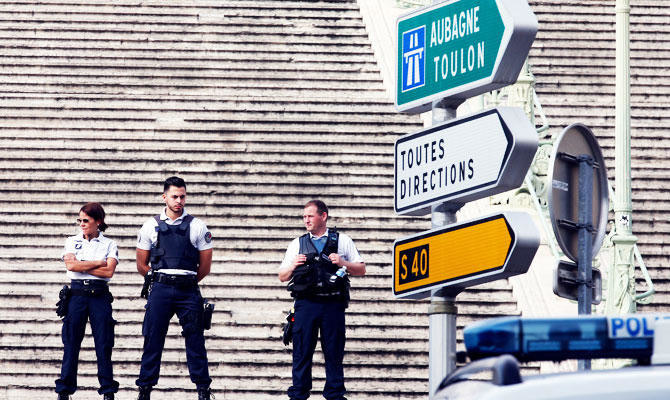
- The arrests took place in the Paris region and in southern France, the PNAT anti-terror unit said
- French prosecutors suspect the eight of preparing and financing terrorist acts
PARIS: French police arrested eight men on Tuesday as part of an investigation into the finances of the Kurdistan Workers Party (PKK), banned as a terror organization by Turkiye and its Western allies, anti-terrorism prosecutors told AFP.
The arrests took place in the Paris region and in southern France, the PNAT anti-terror unit said.
The PKK has been designated a terrorist organization by Turkiye, the United States and the European Union.
French prosecutors suspect the eight of preparing and financing terrorist acts, and of conspiring to extort, or attempt to extort, funds to finance a terrorist organistion between 2020 and 2024, the PNAT said.
Investigators believe the eight to be connected to a campaign to collect funds from Kurdish business people and other Kurds in France, a source close to the case added.
Police can hold the suspects for up to 96 hours for questioning, the source said.
Another source said the funds were destined for use in Belgium, where police on Monday raided Kurdish-run media as part of a probe undertaken at the request of a French anti-terror judge, the PNAT said.
The PKK has waged a decades-long insurgency for greater autonomy for the Kurdish minority of Turkiye in the southeast of the country, in a standoff with the Ankara government that remains unresolved to this day.
Dutch intelligence sees the wars in Gaza and Ukraine as triggers for terrorist threats
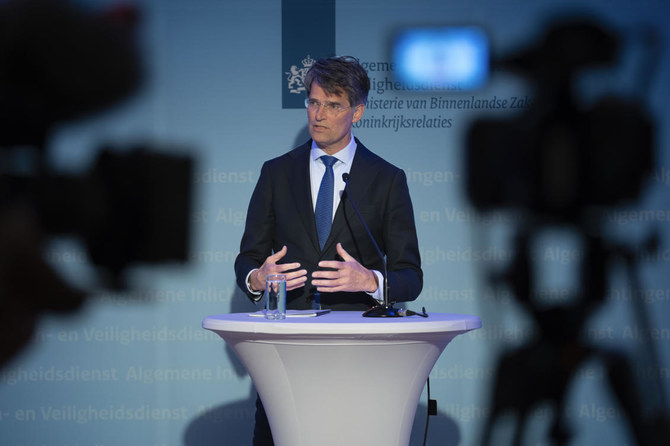
- The Israel-Hamas war in Gaza and the destruction of a Qur’an outside parliament last year are “trigger events” for extremists
- “The terrorist threat is serious at this moment,” the agency’s director-general, Erik Akerboom, told AP
ZOETERMEER, Netherlands: The Dutch national intelligence agency said Tuesday that threats targeting the Netherlands are increasingly connected to worldwide turmoil, including the wars in Gaza and Ukraine.
Although the number of terror attacks across Europe has been down in recent years, the General Intelligence and Security Service in its annual report said the Israel-Hamas war in Gaza and the destruction of a Qur’an outside parliament last year are “trigger events” for extremists.
“The terrorist threat is serious at this moment,” the agency’s director-general, Erik Akerboom, told The Associated Press.
Akerboom said he is particularly concerned about big events, noting that the agency is working closely with French authorities to prevent incidents during the Paris Olympics this summer.
In December, the Dutch counterterrorism agency increased the country’s threat alert to its second-highest level because of concerns about the Daesh group’s Khorasan affiliates, Akerboom said. IS-K, a Central Asian affiliate, was responsible for the attack at a suburban Moscow concert hall that killed at least 133 people in March.
According to the new report, “global jihadism has been the greatest terrorist threat for years in the Netherlands.” Incidents such as the one last April, when an anti-Islam activist tore pages from the Qur’an in front of the Dutch parliament building, put the Netherlands on the map of targets.
About a dozen terror attacks were thwarted by authorities in Europe last year and in four cases, suspects were arrested in the Netherlands, the report said. None of those attacks was focused on the Netherlands, according to Akerboom.
The Dutch also see threats from China, in particular cyberattacks, as a major concern. Akerboom said China is producing more hackers to break into Dutch systems than the Dutch can produce to defend them. The security service has cited China as the biggest threat to the country’s economic security.
Russia also continues to pose a risk to the Netherlands amid Moscow’s full-scale invasion of Ukraine. So-called peace protests in Amsterdam which call for the Dutch to stop sending arms to Ukraine have included demonstrators paid by Russian sources to attend and given prefabricated slogans, the security service has asserted.
The Netherlands is of particular interest to Moscow in part because of the international institutions housed here, including the International Criminal Court. The Hague-based court is investigating crimes in Ukraine and has issued arrest warrants for President Vladimir Putin and other Russians.
Sunak says UK to raise defense spending amid global threats
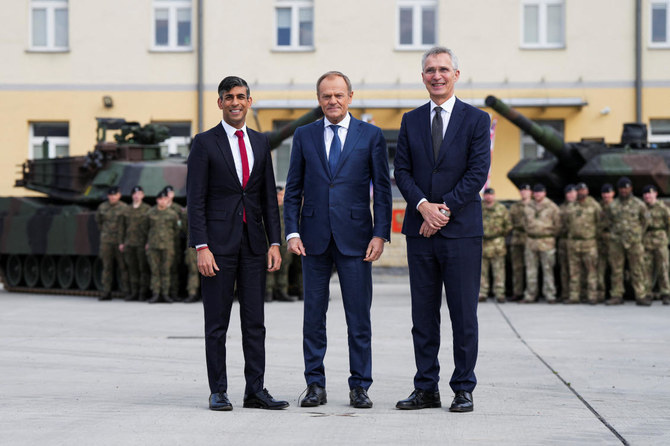
- “In a world that is the most dangerous it has been since the end of the Cold War, we cannot be complacent,” Sunak told reporters
- The increase in spending from 2.3 percent will see the UK become one of the highest spenders on defense in the 32-member defense alliance
WARSAW: Britain will raise defense spending to 2.5 percent of GDP by 2030 in a “most dangerous” world, Prime Minister Rishi Sunak said Tuesday during a visit to Poland.
The commitment came as NATO countries face pressure to raise defense spending in the face of global threats, particularly from Russia.
“In a world that is the most dangerous it has been since the end of the Cold War, we cannot be complacent,” Sunak told reporters in Warsaw, where he held a press conference with NATO Secretary-General Jens Stoltenberg.
The increase in spending from 2.3 percent will see the UK become one of the highest spenders on defense in the 32-member defense alliance after the United States, the British government said.
It means the UK is expected to spend £87 billion on defense in 2030-31, an increase of £23 billion over current levels.
“I believe we must do more to defend our country, our interests, and our values,” Sunak said, announcing “the biggest strengthening of national defense for a generation.”
Western nations are under pressure to boost defense funding following Moscow’s invasion of its neighbor Ukraine as well as the threat of escalation in the Middle East.
EU chief Ursula von der Leyen recently called for a “European awakening on defense and security.”
Brussels is set to come up with more proposals for financing the defense push by a summit of EU leaders in June.
Sunak has also faced calls from his Conservative Party to boost defense spending, with some calling for a level of three percent of GDP.
On Tuesday, Sunak also announced £500 million additional funding for Ukraine’s war effort against Russia.


